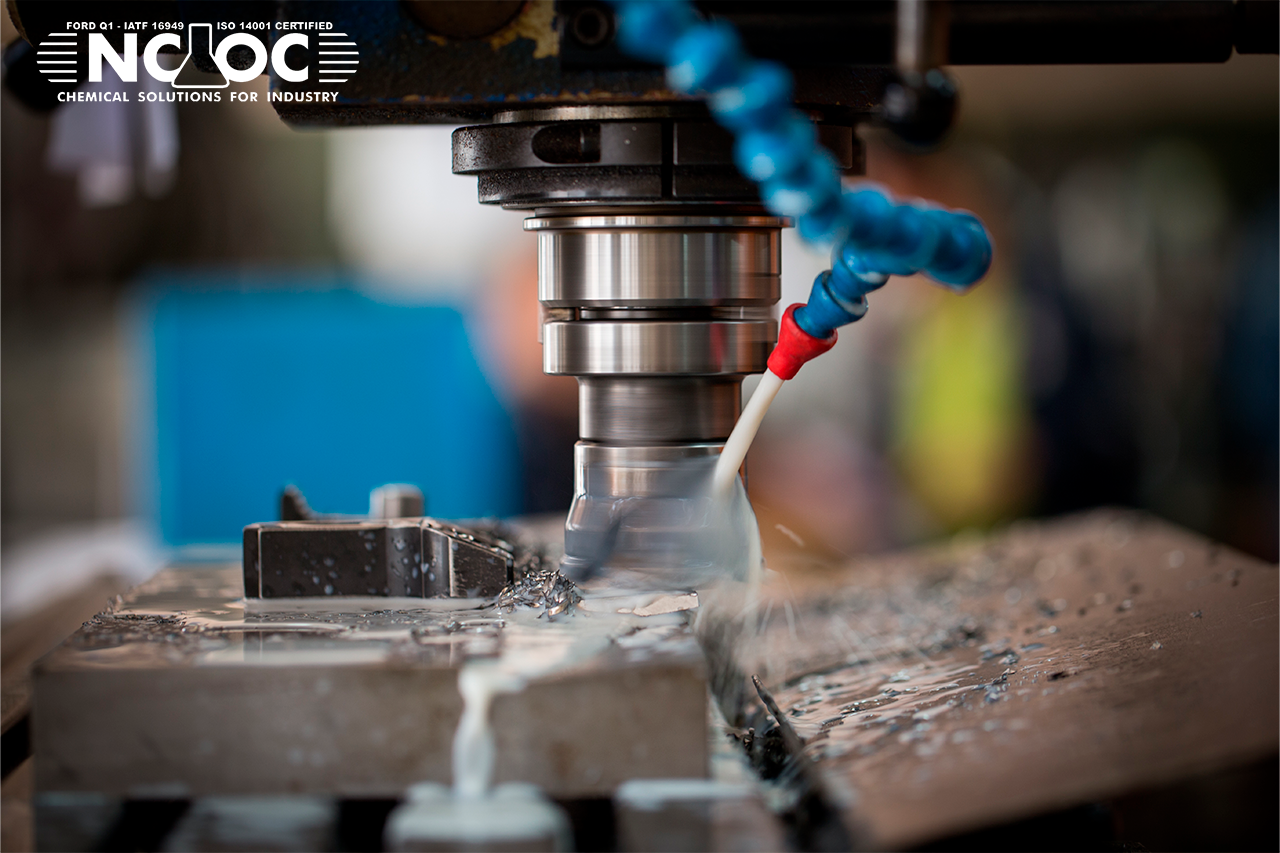Welcome to NCOC Inc. On this occasion we will be sharing with you information on the modern practice of metalworking which involves the cutting and shaping of a wide range of metals and their alloys, each with its own particular machining characteristics, some being easy to work and others very difficult.
Below we present the workpieces metal & fluids most used.
CAST IRON
The familiar grey cast iron consists of an iron base with graphite scattered through it. It’s very easy to machine and can be machined dry, producing swarf of short easily broken chips and a lot of fine, black dust. In practice, however, cutting fluid is generally used to carry away the swarf and dust for removal by the filter. A semi-synthetic like our #IC284 or #IC289R could be a good option.
NODULAR IRON
A variation of grey cast iron is nodular or SG Iron, often used in making engine blocks and similar parts. Composed of an iron base with graphite spheroids scattered throughout, it has easy machining characteristics similar to grey cast iron. It has greater tensile strength and is tougher than grey cast iron. As it corrodes like cast iron and produces the same type of swarf and dust, similar cutting fluids (#IC284 and #IC289R) are recommended.
STEELS
“Steels” covers several metals commonly used but excludes stainless steel and several others which are described below.
With such a wide range, the machinability of steel varies from approximately 100 down to 50 so there is a wide choice of cutting fluid possibilities, both straight and soluble, and each steel has to be considered on its own merits.
The simplest way to make steel harder is to add more carbon but then the harder the metal, the worse the machinability. For example, increasing the carbon content from 0.3% to 0.6% (mild steel) to above 0.6% would require using cutting fluids with increasing EP (extreme pressure) levels. Heat treatment and work hardening also affect machinability. Alloys such as nickel and chromium are also used to harden steel, and they both reduce machinability.
On the other hand, it’s also possible to improve the machinability of steel by adding sulfur or lead to produce what is called free machining steel. The sulfur produces particles of manganese sulfide and this, the same as the lead, opens up tiny cracks in the shear plane which reduces shear stress in the primary deformation zone. A soluble oil as our #IC197 it’s recommended for this kind of material.
STAINLESS STEEL
Stainless steel, heat-resistant alloys, and nimonics (nickel-alloys) are a special group of steels that contain high levels of nickel and cobalt. They work hard and have low thermal conductivity. This allows very high temperatures to form in the chip as well as high temperatures at the chip/tool interface which, if not controlled, will cause the tool to wear out quickly. Straight-cutting oils, especially those with high levels of EP additives, are the main choice for this group of steels. Our #Royal66 and #Royal4700 could be a good choice.
TITANIUM ALLOY
Titanium and its alloys are even more difficult to machine than stainless steel. With a very low thermal conductivity ability, temperatures at the chip/tool interface become extreme. Titanium tends to “weld” itself to the cutting tool under pressure and its abrasive oxides prematurely wear out tools.
These problems are best overcome by using low cutting speeds combined with straight cutting oils containing high levels of EP additives. #Royal74 and #Royal13 are good options for this kind of material.
ALUMINUM AND ALLOYS
Pure aluminum is very awkward to the machine as it adheres to the cutting tool. It’s referred to as a being “sticky”. However, most machining grade aluminum contains small amounts of copper and improves machinability considerably.
Both straight cutting oils and semi-synthetic can be used for machining fluids. The straight oil chosen should have a low viscosity and a fatty and /or chlorinated additive to aid penetration and minimize chip/tool welding, our #ROYAL20 could be an option. The semi-synthetic chosen should be the milky tupe with fatty additives and not too high a pH value for the emulsion as this can cause staining for aluminum, for example, our #IC270
COPPER AND ALLOYS
Pure copper, like pure aluminum, is “sticky” and therefore, difficult to machine. Pure copper also produces long continuous chips which get in the way and interfere with the cutting process. These problems are overcome by the addition of quantities of sulfur or lead.
Copper and brass are machined using a milky type soluble oil. Some care in selection is needed as oils with high alkali, fatty acid or amine levels can cause staining. Straight oils can also be used for machining copper, such as fatted mineral oil. Oils containing sulfur should be avoided as they stain the copper black.
MAGNESIUM AND ALLOYS
Magnesium and its alloys are easy to machine and have convenient ship formations. A point to avoid is that sufficient heat can build up at the chip/tool interface to actually ignite the magnesium. Whereas water-based cutting fluids would seem ideal, the oxygen in the water reacts with the magnesium at tool tip temperatures. For this reason, water-based fluids must never be used for machining magnesium. The correct fluid is a straight oil with low viscosity as our #ROYAL66
We hope that the information is most useful and if you have any questions about it, do not hesitate to contact us, we have highly trained advisors to answer your questions and provide you with the best chemical solutions for the industry.





